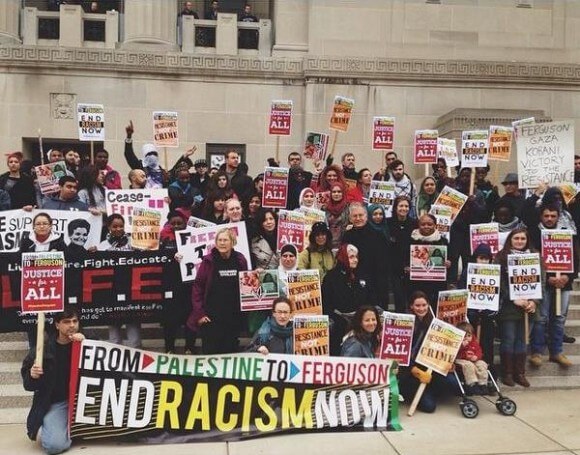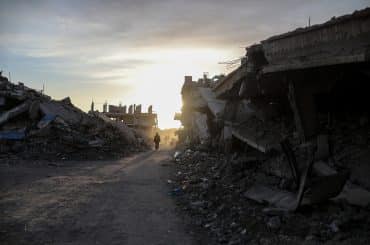This coming weekend, I will be one of hundreds of SJP organizers in Boston for our 2014 national conference. Our theme this year is “Beyond Solidarity: Resisting Racism and Colonialism from the US to Palestine.” The theme reflects our understanding that the struggles of people under these systems are deeply connected, and that our everyday work to support Palestinian self-determination and full human rights should bolster local communities facing similar issues of dispossession, discrimination, and occupation. The urgency of Israel’s deadly assault on Gaza, high-profile police killings of black people, and child refugees along our southern border formed the impetus for this year’s conference.
Those who argue that there is no connection between Ferguson and Palestine have missed the point entirely. “Palestinians were the first to reach out in support while we were getting tear gassed. We stand with y’all,” Millennial Activists United member Ashley Yates said while leading the main rally at Ferguson October. Solidarity is for those under struggle to decide.
So in addition to programming to advance the political education and skill set of our conference attendees, this year’s agenda devotes a significant amount of time to learning from grassroots movements across the US. Organizers from Detroit to Hawaii will come to discuss the intersections of racism, colonialism and environmental justice for Black and Hawaiian populations whose access to water and agriculture is under attack.
Members of the Dream Defenders and Black Youth Project, which both launched in response to Trayvon Martin’s killing, will join with prison abolition activists and organizers from Ferguson to discuss the contemporary fight against mass incarceration and police brutality. Activists advancing work on trans*, queer and gender liberation will show how these movements must be at the center of our work. Student organizers from MEChA, Anakbayan, and United Students Against Sweatshops will share their own stories of seeking justice for migrant people and the working class.
We view our work as being at a critical juncture and value the opportunity to be able to host the conference at Tufts University and in the Boston area. Northeastern University’s SJP is co-hosting the conference after enduring attempts by pro-Israel forces to remove the group from campus last year. And Harvard’s Palestine Solidarity Committee, which participated in the Open Hillel conference less than two weeks ago to widen the scope of discussion on Israel and Palestine, is also a participant in organizing the conference. Our conference continues to advance the notion that American institutions of higher learning have a role to play in the struggle for justice in Palestine and in the US.
While local SJP chapters are autonomous from our national steering committee, the primary objective of all SJP groups is to respond to the Palestinian call for Boycott, Divestment and Sanctions (BDS). The call requests that all citizens of conscience enact various forms of boycott and divestment against Israel or companies that profit from its violation of Palestinian human rights until three criteria are satisfied: 1) the end of the Israeli occupation and colonization of 1967 lands; 2) the right of return and compensation of more than five million Palestinian refugees; and 3) the realization of full legal equality for Palestinian citizens of Israel.
As the BDS movement grows to include an ever-expanding list of religious and labor groups, financial institutions, university student associations, and national governments, we pause to reflect on the local and global context of our work. Leaders of the BDS movement from the US, South Africa, and Palestine itself will close the conference discussing the transnational nature of the BDS movement.
Our dynamic struggle alongside people and movements who fight similar or parallel battles against racism and colonialism is growing and, as BDS leader Omar Barghouti says, “We need to stand together and one way to do that is through BDS targeting companies that oppress all of us – targeting companies that are involved in human rights violations against black Americans in Chicago as well as Palestinians in Gaza.”
No company illustrates more clearly the connections in repression across borders than the private security behemoth G4S. The company profits from Israeli prisons that violate the Fourth Geneva Convention and from private prisons that incarcerate youth, migrants, and people of color in the US, UK, Australia and Sout
Racism and colonialism have always operated on an intersectional and global level. In the spirit of strengthening the global movement to liberate all peoples, we dedicate this year’s conference not only to expressing solidarity with other movements, but to moving from expressing it with words to expressing it by committing to self-education and concrete joint action. We invite local Boston academics to join us for the open sessions of the conference and we invite students, staff and faculty across the nation to consider their role in these struggles towards justice.



Excellent words, Kristian. Just the kind of solidarity that’s needed – if it really happens on the campuses.
Before Thanksgiving, I hope to see student government meetings filled with “Boycott Israel” banners, or at least a crowd chanting “Divest, Divest, Divest” as we saw at Michigan in March 2014.
That would make this column true – a door flung open to liberation, much more than just words.
So the campaign is all about
OK, please explain why the sole focus is on Palestine. The Zionists who first began arriving in numbers during the 19th century could hardly be classified as colonialists as they paid legitimately for barren land, usually owned by absentee landlords, who did not nothing except luxuriate in Istanbul, Cairo or Damascus.
Why are these people not insisting that white Australians return Australia to their rightful owners the aborigines and white Americans return the land they stole from the the Red Indians? Surely the crime of white racists coming to these countries and raping, murdering, pillaging and plundering the local inhabitants and then relegating them to a subservient existence is far, far worse than what allegedly happened in Palestine.
In Palestine the native inhabitants were never willing to entertain a significant Jewish presence and they had their Arab brethren in the neighboring countries to come and bat for them to ensure the conflict would never get resolved other than in their favour. They have never been prepared to accept anything less.